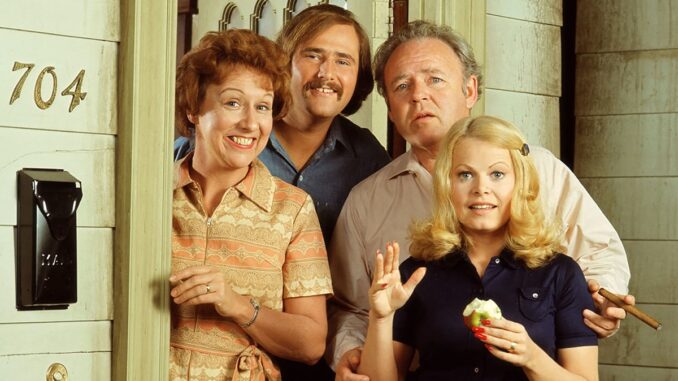
A Sitcom Like No Other
When All in the Family first hit American TV screens on January 12, 1971, no one could have predicted the tidal wave it would cause in the entertainment world. It wasn’t just another family sitcom. It was raw, real, funny, and at times, uncomfortably honest. The brainchild of Norman Lear, All in the Family shattered the norms of network television, fearlessly tackling subjects like racism, sexism, politics, and generational divides.
At its center was Archie Bunker, portrayed brilliantly by Carroll O’Connor — a blue-collar, conservative bigot whose outdated views clashed constantly with his liberal son-in-law, “Meathead” (Rob Reiner). The show didn’t ask you to love Archie — it asked you to think about him.
 Breaking Boundaries on Primetime
Breaking Boundaries on Primetime
Before All in the Family, TV shows largely avoided controversy. Families on screen were squeaky clean and apolitical. But this show threw all that out the window. It tackled real-life issues head-on:
-
Race relations
-
Women’s liberation
-
Vietnam War protests
-
Homosexuality
-
Religious tolerance
And it didn’t just reference these topics in passing. It debated them, joked about them, and exposed them — often within the walls of the Bunker household.
This was the first time many Americans heard certain words and phrases on network TV. CBS even issued disclaimers ahead of episodes. The result? All in the Family became a national conversation starter.
Ratings Royalty and Cultural Impact
The show didn’t just make noise — it dominated. For five consecutive years (1971–1976), it was the No. 1 show in America. It won four consecutive Emmy Awards for Outstanding Comedy Series and solidified Carroll O’Connor, Jean Stapleton, Rob Reiner, and Sally Struthers as household names.
But its impact went far beyond ratings:
-
Archie Bunker’s chair now sits in the Smithsonian.
-
It spawned legendary spinoffs like Maude, The Jeffersons, and Good Times.
-
It redefined the sitcom format and paved the way for shows like Roseanne, The Simpsons, and Modern Family.
Archie Bunker: The Flawed Everyman
Archie was bigoted, loud, and often ignorant. Yet, he was never written as pure villain. His contradictions made him compelling. He could be both hateful and hilarious, wrongheaded yet relatable.
Norman Lear’s genius was showing the humanity behind Archie’s prejudice. Viewers laughed at him, sometimes with him, and occasionally saw reflections of themselves in him. That complexity changed how characters were written on TV forever.
A Mirror to Society
What made All in the Family so unforgettable was its refusal to sugarcoat America’s problems. It forced audiences to reflect on their own beliefs. It dared to ask tough questions — without offering easy answers. And it did so while making millions of people laugh.
In today’s era of divided politics and culture wars, the show feels just as relevant — maybe even more so.
The Legacy Lives On
Though it ended in 1979 (transitioning into Archie Bunker’s Place), All in the Family left a permanent stamp on American culture. Norman Lear’s influence reshaped not just what TV could do, but what it should do.
In 2019, a live special of All in the Family aired on ABC with Woody Harrelson as Archie and Marisa Tomei as Edith — proof that the show’s voice still echoes today.
Final Thoughts
All in the Family wasn’t just television — it was a cultural earthquake. It proved that comedy could be more than entertainment. It could challenge, provoke, and enlighten.
Decades later, we’re still laughing. Still cringing. And still talking about Archie Bunker.
